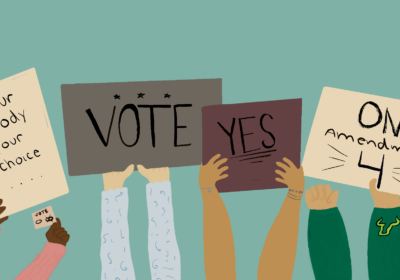Political parties hinder student elections
When it comes to creating long-standing political parties, USF has failed where many other universities have succeeded – a positive testament to the Student Government (SG) voting system.
USF has seen just a few attempts to create political parties within SG, such as last June’s Green and Gold Party. Yet James Bodden, supervisor of elections for the SG Election Rules Committee, told the Oracle that SG members have, traditionally, not taken political parties seriously. This is a precedent that future SG leaders should adhere to.
According to the Independent Florida Alligator, the University of Florida’s student newspaper, UF’s election seasons have been marred by questionable campaigning tactics from political parties.
In 2010, an audio recording of a Unite Party campaign meeting at UF included party members congratulating sororities for not letting members eat until they voted and rewarding those who did vote with alcohol, according to the Alligator.
This year, the party was accused of throwing away hundreds of copies of The Alligator as a “campaign tactic.” Both incidents are telling examples of the dangers of the group mentality involved in party systems.
This year, USF’s relatively quiet election season has allowed students to get to know candidates based on debate platforms and individual tactics such as chalking, as opposed to group campaigning which can involve high spending and peer pressure. The result is a hampered democratic process where the best candidate does not necessarily win.
Though political parties may encourage more students to vote by having more people involved in the campaign process, this does not necessarily benefit universities in the long run. Juliet Kesilyas, supervisor of elections at FSU, told The Oracle the campus’s parties rarely garner lasting support after their goals have been addressed.
While UF’s voter turnout may be higher than USF’s – this year’s elections saw 10,644 votes cast while USF hopes to break last year’s record 6,000 votes – one has to wonder what will do more good in the long run: masses of votes based on name recognition or a few votes based purely on platforms. Attracting meaningful voters cannot be accomplished by political parties, but by understanding the needs of the voting demographic.
Though federal, state and local politics are dominated by the Republican and Democratic parties, plenty of time is wasted when legislators choose to simply align with their party’s stance on the issue, prolonging the issue from being resolved. And though some may believe that this is the way to get bills passed in SG, allowing for greater support from SG senators who align with the party, USF has done fine without parties thus far.
Even President George Washington warned against political parties in his Farewell Address, saying that political parties end up “destroying afterwards the very engines which have lifted them to unjust dominion.” USF is right to work on a party-free system. USF SG candidates are required to work in the best interests of the whole campus population, instead of just one segment.
Jessica Schoenfeld is a sophomore majoring in sociology and women’s studies.






